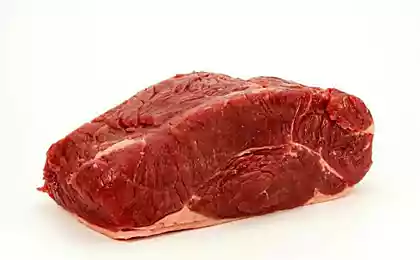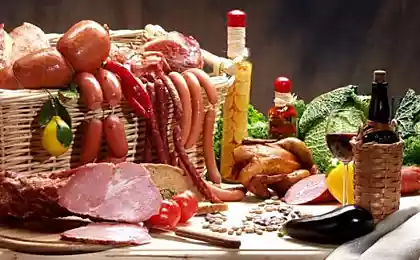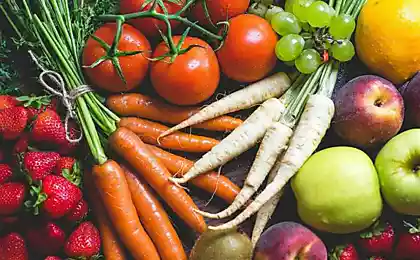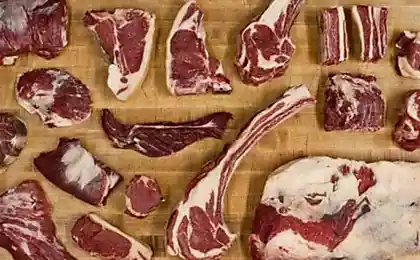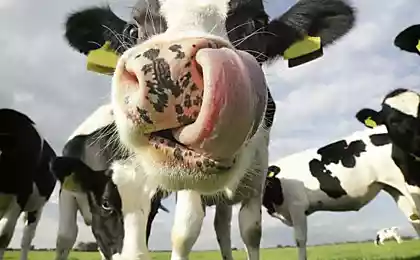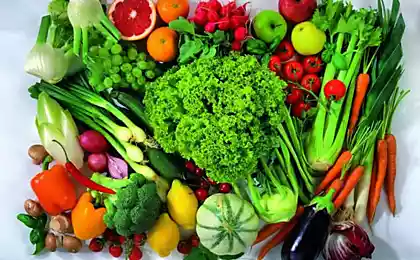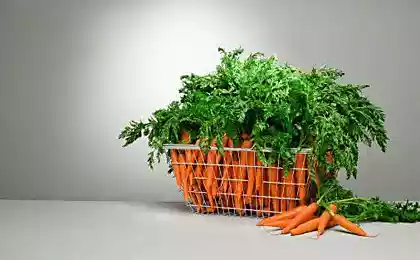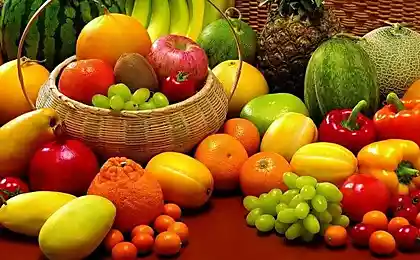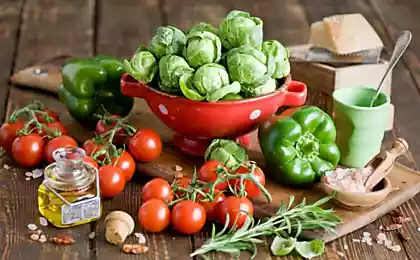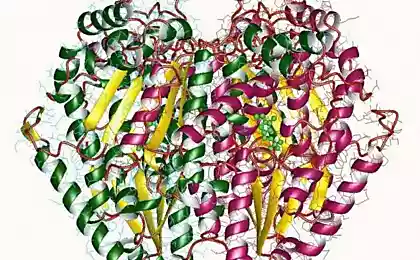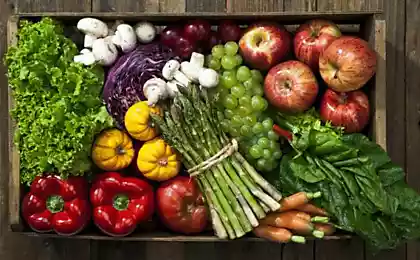611
The most important nutrients for those who do not eat meat
In this overview tells you some nutrients that deserve special attention on the part of vegetarians. As well as in all positions, every sentence here is based on peer-reviewed studies published in scientific journals.
AN OVERVIEW OF THE MOST IMPORTANT FOR VEGETARIANS NUTRIENTS
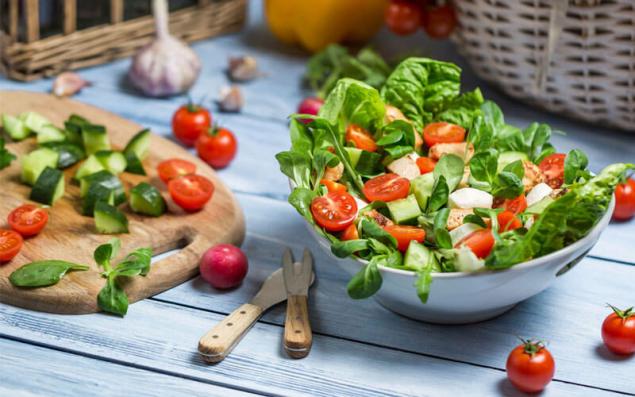
Protein
Vegetable protein can satisfy the body's need for protein, provided that in the food used by different types of plants and the body gets the required amount of energy. Studies have shown that a variety of plant foods consumed throughout the day can provide a healthy adult body with all essential amino acids and nitrogen. Thus, the additional intake of vegetarian protein is not required.
Meta-analysis studies of nitrogen balance in the body did not find any significant differences in the amount of necessary protein, depending on its source. Other studies, in which the basis was taken as the most important for assessing protein quality in the PDCAAS index (ratio of amino acids, adjusted for protein digestibility corrected) showed that, while not supported by other sources of protein, soybean protein is just as effective as animal protein, eating exclusively protein wheat, for example, may lead to lower use efficiency of nitrogen. Thus, vegans need protein in the products may vary, in a certain according to their food preferences. Nutritionists must keep in mind that for those vegetarians that consume sources of protein and less digestible products such as cereals and legumes, protein needs may be higher than officially recommended.
In a little grain contains lysine, one of essential amino acids. It is necessary to pay attention to when assessing the diet of people who do not consume animal protein, and generally includes in its diet small amount of protein. Dietary recommendations such as eating more quantities of beans and soy products instead of sources of protein, poor in lysine, or a General increase in consumption of protein foods can ensure sufficient intake of lysine.
Although the level of protein consumption in some women-vegans is on the border of acceptable, in General, lactoovovegetarians and vegans, apparently, are getting sufficient or even in excess of the normal amount of protein. Athletes can also receive the required amount of protein adhering to a vegetarian diet.
Fatty acids omega-3
Vegetarian diets are usually rich in fatty acids omega-6, may contain insufficient amounts of omega-3. Rations in which there are no fish, eggs or a large enough amount of algae, usually contain little eicosapentaenoic acid (eicosapentaenoic acid, EPA) and docosahexaenoic acid (docosahexaenoic acid, DHA), important for cardiovascular system, vision and brain development. Bioconversion of alpha-linolenic acid (?-linolenic acid, ALA), omega-3 of vegetable origin in the EPA in the human body is less than 10 %. The percentage of convertible DHA from ALA is much lower. Vegetarians, especially vegans, there is lower blood levels of EPA and DHA than people who consume animal food. Well absorbed Supplement with DHA derived from microalgae. They increase DHA content and, through retroconversion, with EPA. In shops you can buy soy milk and cereals enriched with DHA.
Dietary recommendations the Institute of medicine of the National Academy of Sciences of the United States recommended daily consumption of 1.6 grams of ALA for men and 1.1 for women. Specified in the recommendations of the standards may be inadequate for vegetarians, consuming a small amount or not consuming DHA and EPA. They may be recommended additional intake of ALA to convert it into DHA and EPA. In the case of moderate consumption of fatty acids omega-6, the degree of conversion of ALA into DHA and EPA may increase. Vegetarians should include in your diet good sources of ALA, such as Flaxseed, walnuts, canola oil and soy. In periods of increased requirement for fatty acids omega-3, for example, pregnancy and nursing women may be recommended intake of DHA-enriched microalgae.
Iron
The iron in plant foods is a gentle non-heme and is sensitive to both inhibitors and enhancers of the process of its absorption. To inhibitors of iron absorption include phytates, calcium, and contained in the tea, herbal tea, coffee and cocoa polyphenols.
Dietary fiber is only to a small extent inhibits the absorption of iron. Such manipulations as soaking and sprouting beans, grains and seeds, and add yeast when baking bread may reduce the level of Filatov and thus increase the absorbability of iron. Other ways of fermentation, such as those used in the preparation of miso and tempea, can also improve the bioavailability of iron.
Vitamin C and other organic acids contained in fruits and vegetables, can notably increase the absorption of iron and weaken the overwhelming effect of Filatov, thereby enhancing the level of iron content in the body. Due to lower bioavailability of iron in vegetarian diet, the recommended intake of iron for vegetarians is 1.8 times higher than normal.
Although a large number of experiments to determine the level of iron absorption under different feeding style was conducted over a short period, there is evidence that with less intake of iron is the adaptation of the organism: absorption is increased, and the losses become less. The incidence of iron deficiency anemia among vegetarians and non are about the same. Despite the fact that in adult vegetarians of body iron stores is less than that of-vegetarians are, their level of ferritin in blood serum usually within normal limits.
Zinc
The bioavailability of zinc in vegetarian eating patterns lower than a conventional diet, mainly due to a higher amount of phytic acid in the body vegetarian. So for those vegetarians whose diet consists mostly of rich piratami unprocessed grains and legumes, recommendations for zinc intake may be higher than normal. Different studies show different levels of consumption vegetarian zinc: some say that the zinc is consumed in sufficient quantity, while others indicate strongly reduced in comparison with the recommended standards of consumption, receipt. It is impossible to speak with confidence about insufficient consumption of zinc vegetarian Europe and the United States. Because of difficulties with the definition of the minimum necessary level of zinc in the body, it is impossible to determine the possible effect of lower zinc absorption vegetarians. Sources of zinc are soy products, legumes, grains, cheese and nuts. Soaking and sprouting beans, grains and seeds, and the fermentation test, can reduce binding of zinc by phytic acid and increase the bioavailability. Organic acids such as citric acid, may also to some extent contribute to the better absorbability of zinc.
Iodine
Some researchers are inclined to believe that vegans do not have recourse to additional sources of iodine, such as iodized salt or sea vegetables, may be at risk of iodine deficiency because the items of vegetarian diets are usually poor in iodine. Sea salt and kosher salt are usually not jodorowksy, as well as salt and spices such as tamari. You should monitor the amount of iodine consumed together with sea vegetables as the iodine content in them varies, and not all of them significantly.
In soybeans, cruciferous vegetables and potato contains agents that suppress thyroid function. But any connection between the consumption of these products and development of insufficiency of thyroid function, provided a sufficient supply of iodine, have been identified.
Calcium
The volume of calcium consumed by lactoovovegetarians are on the same level or even higher than consumption-vegetarians are. The least amount of calcium consume vegans, it can be even lower than the recommended norms.
Researchers at Oxford University in the framework of the European prospective study on cancer and nutrition (EPIC-Oxford) came to the conclusion that vegans have a 30% greater risk of bone fractures, compared with lactoovovegetarians and-vegetarians are, the difference in risk between them was revealed. Perhaps this is due to less intake of calcium in the body vegans. Rations in which a significant part of meat, fish, dairy products, nuts and grains, to create a greater acid load on the kidneys, mainly due to the accumulation there of sulfate and phosphate precipitation. The intake of calcium from the bones helping to reduce this burden, but as a result, the reserves of calcium are reduced. Abundant intake of sodium also promotes calcium excretion from the body. On the other hand, fruits and vegetables rich in potassium and magnesium, contribute to the accumulation in the kidneys alkaline, which slows the loss of bone calcium, thereby reducing its consumption. In addition, some studies show that the ratio of dietary calcium and protein – more faithful indicator of bone health, than just the volume of consumed calcium. In the diets of lactoovovegetarians this ratio is generally high and contributes to bone health, whereas vegans have this attitude is at the same level or lower than that of people who consume animal food. Many vegans choose a more simple way to satisfy the body's need for calcium by eating nutritional supplements and calcium-fortified products.
Green vegetables low in oxalates for example, Pak Choy, broccoli, cabbage, Kale and broccoli are good sources of highly absorbable calcium (50 to 60%), whereas the digestibility of cow's milk, and tofu with calcium sulfate as coagulant is 30-35%, and sesame seeds, almonds and dried beans – from 21 to 27% (*the percentage is more if the nuts are soaked). The absorption of calcium from soy milk fortified with calcium carbonate, the same as from cow's milk, although some studies have shown that calcium assimilation is significantly reduced when soy beverage is added to the tricalcium phosphate. Good sources of calcium for vegans can be fortified foods: fruit juices, soy milk, rice milk and cereals. Contained in some foods, such as spinach and leaf beet, oxalates greatly reduce calcium absorption, so these vegetables are poor sources of calcium for the body. Products with a high content of Filatov (tea, coffee, cocoa) can also inhibit calcium absorption.
Vitamin D
About the importance of vitamin D to health has long been known. The amount of vitamin D in the body depends on the duration of exposure to the sun, and the amount of consumption of enriched products and they supplements. The amounts of vitamin D synthesized by the body due to exposure to sunlight, is very different and depends on several factors: time of day, time of year, geographical latitude, level of skin pigmentation, the use or nonuse of sunscreen, age. In some groups, vegans and people who adhere to macrobiotic diets, not consuming fortified foods and vitamin supplements, was witnessed by a small intake of vitamin D low levels of 25-hydroxyvitamin D in serum and a decrease in bone mass.
Among foods enriched with vitamin D, meet the cow's milk, some brands of soy milk, rice milk, orange juice, some cereals and varieties of margarine. Vitamin D-3, or cholecalciferol, — animal origin and is produced by ultraviolet irradiation of 7-dehydrocholesterol present in the lanolin. Vitamin D-2, or ergocalciferol, is formed under the influence of ultraviolet rays on ergosterol, a part of the yeast and therefore suitable for vegans. While some studies suggest that vitamin D-2 is less effective for maintaining normal levels of 25-hydroxyvitamin D in the blood serum, the results of other studies show equal effectiveness of vitamins D-2 and D-3. If to meet the body's needs for vitamin D sun exposure and consumption of fortified products is not enough, it is advisable to include in the diet vitamin supplements.
*Many sources say that it is enough for 15-20 minutes of sun exposure to synthesize enough vitamin D for two or three days.
Vitamin B-12
Vitamin B-12 in the body of some vegetarians less because their diets are not always present reliable sources. Lactoovovegetarians unable to obtain sufficient amounts of vitamin B-12, regularly consuming eggs (*naturopaths and supporters HLS, even raw foodists, is often used to replenish B12 raw egg yolks village, freely grazing chicken), dairy products and other guaranteed sources such as fortified foods and dietary supplements. Vegans can get the required amount of vitamin B-12 regularly consuming food enriched food: beverages based on soy and rice, some Breakfast cereals, meat substitutes and nutrient-rich yeast of the brand Red Star Vegetarian Support Formula (Vegetarian formula Red star); otherwise, the necessary nutritional supplements. None of the enriched product of plant origin does not contain significant amounts of active vitamin B-12. Fermented soy products cannot be considered a reliable source of active vitamin B-12.
A vegetarian diet is generally rich in folic acid, which masks the hematological symptoms of vitamin B-12. Thus, a deficiency of vitamin B-12 may not be detected before the development of disorders of the nervous system. Best vitamin B-12 in the organism is determined by measuring the level of homocysteine, methylmalonic acid and holotranscobalamin II in serum.
An overview of the most important for vegetarians nutrient prepared philadelphia_.livejournal.com on the basis of the text the position of the American Dietetic Association Regarding Vegetarian diet.
P. S. And remember, only by changing their consumption — together we change the world! ©
Source: ecoways.ru/ru/rss/articles/Samie_vazhnie_pitatelnie_veshestva_dla_teh_kto_ne_est_masa.html
AN OVERVIEW OF THE MOST IMPORTANT FOR VEGETARIANS NUTRIENTS

Protein
Vegetable protein can satisfy the body's need for protein, provided that in the food used by different types of plants and the body gets the required amount of energy. Studies have shown that a variety of plant foods consumed throughout the day can provide a healthy adult body with all essential amino acids and nitrogen. Thus, the additional intake of vegetarian protein is not required.
Meta-analysis studies of nitrogen balance in the body did not find any significant differences in the amount of necessary protein, depending on its source. Other studies, in which the basis was taken as the most important for assessing protein quality in the PDCAAS index (ratio of amino acids, adjusted for protein digestibility corrected) showed that, while not supported by other sources of protein, soybean protein is just as effective as animal protein, eating exclusively protein wheat, for example, may lead to lower use efficiency of nitrogen. Thus, vegans need protein in the products may vary, in a certain according to their food preferences. Nutritionists must keep in mind that for those vegetarians that consume sources of protein and less digestible products such as cereals and legumes, protein needs may be higher than officially recommended.
In a little grain contains lysine, one of essential amino acids. It is necessary to pay attention to when assessing the diet of people who do not consume animal protein, and generally includes in its diet small amount of protein. Dietary recommendations such as eating more quantities of beans and soy products instead of sources of protein, poor in lysine, or a General increase in consumption of protein foods can ensure sufficient intake of lysine.
Although the level of protein consumption in some women-vegans is on the border of acceptable, in General, lactoovovegetarians and vegans, apparently, are getting sufficient or even in excess of the normal amount of protein. Athletes can also receive the required amount of protein adhering to a vegetarian diet.
Fatty acids omega-3
Vegetarian diets are usually rich in fatty acids omega-6, may contain insufficient amounts of omega-3. Rations in which there are no fish, eggs or a large enough amount of algae, usually contain little eicosapentaenoic acid (eicosapentaenoic acid, EPA) and docosahexaenoic acid (docosahexaenoic acid, DHA), important for cardiovascular system, vision and brain development. Bioconversion of alpha-linolenic acid (?-linolenic acid, ALA), omega-3 of vegetable origin in the EPA in the human body is less than 10 %. The percentage of convertible DHA from ALA is much lower. Vegetarians, especially vegans, there is lower blood levels of EPA and DHA than people who consume animal food. Well absorbed Supplement with DHA derived from microalgae. They increase DHA content and, through retroconversion, with EPA. In shops you can buy soy milk and cereals enriched with DHA.
Dietary recommendations the Institute of medicine of the National Academy of Sciences of the United States recommended daily consumption of 1.6 grams of ALA for men and 1.1 for women. Specified in the recommendations of the standards may be inadequate for vegetarians, consuming a small amount or not consuming DHA and EPA. They may be recommended additional intake of ALA to convert it into DHA and EPA. In the case of moderate consumption of fatty acids omega-6, the degree of conversion of ALA into DHA and EPA may increase. Vegetarians should include in your diet good sources of ALA, such as Flaxseed, walnuts, canola oil and soy. In periods of increased requirement for fatty acids omega-3, for example, pregnancy and nursing women may be recommended intake of DHA-enriched microalgae.
Iron
The iron in plant foods is a gentle non-heme and is sensitive to both inhibitors and enhancers of the process of its absorption. To inhibitors of iron absorption include phytates, calcium, and contained in the tea, herbal tea, coffee and cocoa polyphenols.
Dietary fiber is only to a small extent inhibits the absorption of iron. Such manipulations as soaking and sprouting beans, grains and seeds, and add yeast when baking bread may reduce the level of Filatov and thus increase the absorbability of iron. Other ways of fermentation, such as those used in the preparation of miso and tempea, can also improve the bioavailability of iron.
Vitamin C and other organic acids contained in fruits and vegetables, can notably increase the absorption of iron and weaken the overwhelming effect of Filatov, thereby enhancing the level of iron content in the body. Due to lower bioavailability of iron in vegetarian diet, the recommended intake of iron for vegetarians is 1.8 times higher than normal.
Although a large number of experiments to determine the level of iron absorption under different feeding style was conducted over a short period, there is evidence that with less intake of iron is the adaptation of the organism: absorption is increased, and the losses become less. The incidence of iron deficiency anemia among vegetarians and non are about the same. Despite the fact that in adult vegetarians of body iron stores is less than that of-vegetarians are, their level of ferritin in blood serum usually within normal limits.
Zinc
The bioavailability of zinc in vegetarian eating patterns lower than a conventional diet, mainly due to a higher amount of phytic acid in the body vegetarian. So for those vegetarians whose diet consists mostly of rich piratami unprocessed grains and legumes, recommendations for zinc intake may be higher than normal. Different studies show different levels of consumption vegetarian zinc: some say that the zinc is consumed in sufficient quantity, while others indicate strongly reduced in comparison with the recommended standards of consumption, receipt. It is impossible to speak with confidence about insufficient consumption of zinc vegetarian Europe and the United States. Because of difficulties with the definition of the minimum necessary level of zinc in the body, it is impossible to determine the possible effect of lower zinc absorption vegetarians. Sources of zinc are soy products, legumes, grains, cheese and nuts. Soaking and sprouting beans, grains and seeds, and the fermentation test, can reduce binding of zinc by phytic acid and increase the bioavailability. Organic acids such as citric acid, may also to some extent contribute to the better absorbability of zinc.
Iodine
Some researchers are inclined to believe that vegans do not have recourse to additional sources of iodine, such as iodized salt or sea vegetables, may be at risk of iodine deficiency because the items of vegetarian diets are usually poor in iodine. Sea salt and kosher salt are usually not jodorowksy, as well as salt and spices such as tamari. You should monitor the amount of iodine consumed together with sea vegetables as the iodine content in them varies, and not all of them significantly.
In soybeans, cruciferous vegetables and potato contains agents that suppress thyroid function. But any connection between the consumption of these products and development of insufficiency of thyroid function, provided a sufficient supply of iodine, have been identified.
Calcium
The volume of calcium consumed by lactoovovegetarians are on the same level or even higher than consumption-vegetarians are. The least amount of calcium consume vegans, it can be even lower than the recommended norms.
Researchers at Oxford University in the framework of the European prospective study on cancer and nutrition (EPIC-Oxford) came to the conclusion that vegans have a 30% greater risk of bone fractures, compared with lactoovovegetarians and-vegetarians are, the difference in risk between them was revealed. Perhaps this is due to less intake of calcium in the body vegans. Rations in which a significant part of meat, fish, dairy products, nuts and grains, to create a greater acid load on the kidneys, mainly due to the accumulation there of sulfate and phosphate precipitation. The intake of calcium from the bones helping to reduce this burden, but as a result, the reserves of calcium are reduced. Abundant intake of sodium also promotes calcium excretion from the body. On the other hand, fruits and vegetables rich in potassium and magnesium, contribute to the accumulation in the kidneys alkaline, which slows the loss of bone calcium, thereby reducing its consumption. In addition, some studies show that the ratio of dietary calcium and protein – more faithful indicator of bone health, than just the volume of consumed calcium. In the diets of lactoovovegetarians this ratio is generally high and contributes to bone health, whereas vegans have this attitude is at the same level or lower than that of people who consume animal food. Many vegans choose a more simple way to satisfy the body's need for calcium by eating nutritional supplements and calcium-fortified products.
Green vegetables low in oxalates for example, Pak Choy, broccoli, cabbage, Kale and broccoli are good sources of highly absorbable calcium (50 to 60%), whereas the digestibility of cow's milk, and tofu with calcium sulfate as coagulant is 30-35%, and sesame seeds, almonds and dried beans – from 21 to 27% (*the percentage is more if the nuts are soaked). The absorption of calcium from soy milk fortified with calcium carbonate, the same as from cow's milk, although some studies have shown that calcium assimilation is significantly reduced when soy beverage is added to the tricalcium phosphate. Good sources of calcium for vegans can be fortified foods: fruit juices, soy milk, rice milk and cereals. Contained in some foods, such as spinach and leaf beet, oxalates greatly reduce calcium absorption, so these vegetables are poor sources of calcium for the body. Products with a high content of Filatov (tea, coffee, cocoa) can also inhibit calcium absorption.
Vitamin D
About the importance of vitamin D to health has long been known. The amount of vitamin D in the body depends on the duration of exposure to the sun, and the amount of consumption of enriched products and they supplements. The amounts of vitamin D synthesized by the body due to exposure to sunlight, is very different and depends on several factors: time of day, time of year, geographical latitude, level of skin pigmentation, the use or nonuse of sunscreen, age. In some groups, vegans and people who adhere to macrobiotic diets, not consuming fortified foods and vitamin supplements, was witnessed by a small intake of vitamin D low levels of 25-hydroxyvitamin D in serum and a decrease in bone mass.
Among foods enriched with vitamin D, meet the cow's milk, some brands of soy milk, rice milk, orange juice, some cereals and varieties of margarine. Vitamin D-3, or cholecalciferol, — animal origin and is produced by ultraviolet irradiation of 7-dehydrocholesterol present in the lanolin. Vitamin D-2, or ergocalciferol, is formed under the influence of ultraviolet rays on ergosterol, a part of the yeast and therefore suitable for vegans. While some studies suggest that vitamin D-2 is less effective for maintaining normal levels of 25-hydroxyvitamin D in the blood serum, the results of other studies show equal effectiveness of vitamins D-2 and D-3. If to meet the body's needs for vitamin D sun exposure and consumption of fortified products is not enough, it is advisable to include in the diet vitamin supplements.
*Many sources say that it is enough for 15-20 minutes of sun exposure to synthesize enough vitamin D for two or three days.
Vitamin B-12
Vitamin B-12 in the body of some vegetarians less because their diets are not always present reliable sources. Lactoovovegetarians unable to obtain sufficient amounts of vitamin B-12, regularly consuming eggs (*naturopaths and supporters HLS, even raw foodists, is often used to replenish B12 raw egg yolks village, freely grazing chicken), dairy products and other guaranteed sources such as fortified foods and dietary supplements. Vegans can get the required amount of vitamin B-12 regularly consuming food enriched food: beverages based on soy and rice, some Breakfast cereals, meat substitutes and nutrient-rich yeast of the brand Red Star Vegetarian Support Formula (Vegetarian formula Red star); otherwise, the necessary nutritional supplements. None of the enriched product of plant origin does not contain significant amounts of active vitamin B-12. Fermented soy products cannot be considered a reliable source of active vitamin B-12.
A vegetarian diet is generally rich in folic acid, which masks the hematological symptoms of vitamin B-12. Thus, a deficiency of vitamin B-12 may not be detected before the development of disorders of the nervous system. Best vitamin B-12 in the organism is determined by measuring the level of homocysteine, methylmalonic acid and holotranscobalamin II in serum.
An overview of the most important for vegetarians nutrient prepared philadelphia_.livejournal.com on the basis of the text the position of the American Dietetic Association Regarding Vegetarian diet.
P. S. And remember, only by changing their consumption — together we change the world! ©
Source: ecoways.ru/ru/rss/articles/Samie_vazhnie_pitatelnie_veshestva_dla_teh_kto_ne_est_masa.html
Lawrence Smith: a fungus of the genus Candida is present in almost every
9 lessons productive life, peeped in children
